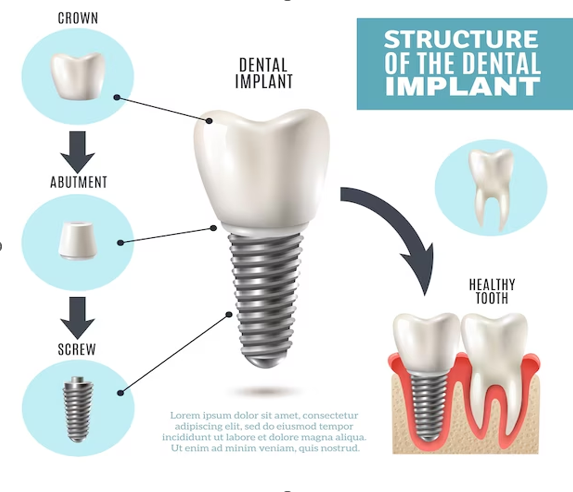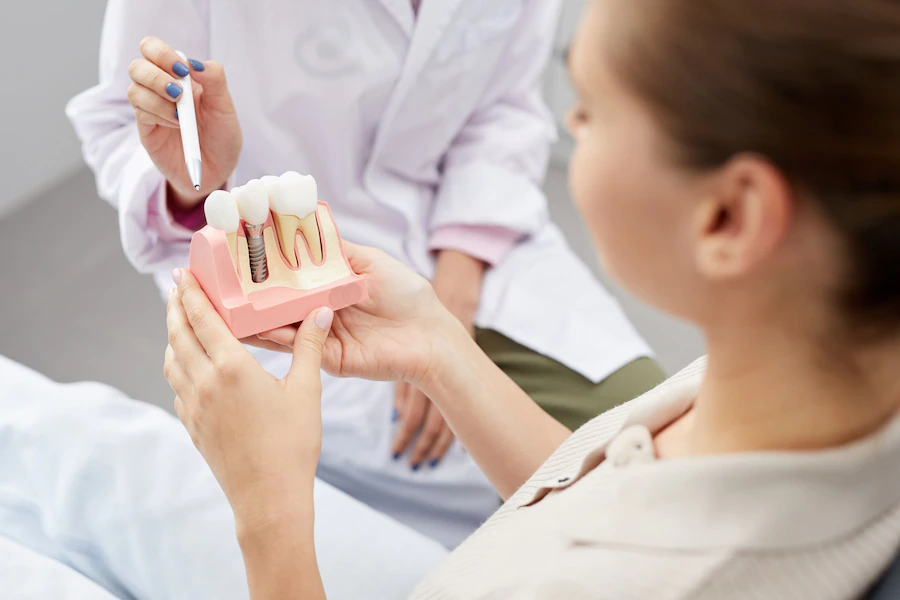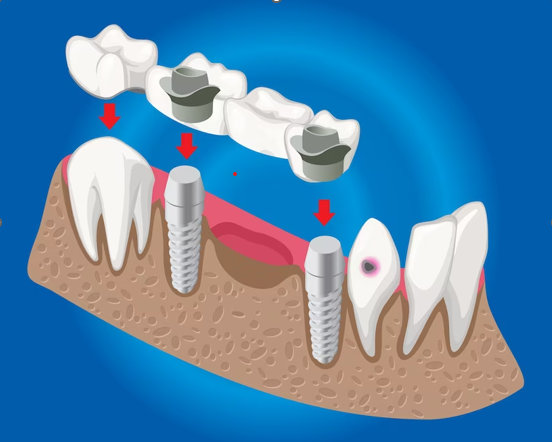The saying “Smile, and the world smiles with you” may hold true, but for some, smiling is not as easy as it sounds. It is especially true for those with missing teeth or dental problems. Fortunately, dental implants have become a popular and effective way to restore a healthy and radiant smile. This post will discuss the different types of dental implants available. Whether you are considering dental implants for functional or cosmetic reasons, this guide will provide the information you need to make an informed decision.
What Is A Dental Implant?
Dental implants are artificial tooth roots of titanium surgically placed into the jawbone to support a replacement tooth or bridge. They are one of the most popular and effective options for replacing missing teeth. Its primary purpose is to provide a durable and stable replacement tooth or bridge base. Unlike dentures, which can slip or shift in the mouth, implants are securely anchored in the jawbone, providing a more natural and comfortable fit. Dental implants can also improve speech, prevent bone loss in the jaw, and restore facial structure that may have been lost due to missing teeth.
Dental Implant System
Dental implants are made of titanium and act as artificial tooth roots surgically placed into the jawbone where the natural tooth root used to be. Once implanted, they fuse with the jawbone through osseointegration, creating a durable and stable foundation for a replacement tooth or bridge.
A dental implant comprises three main components: the implant body or fixture, the abutment, and the crown. The implant body or fixture is the portion of the implant that is surgically placed into the jawbone. It is typically cylindrical and has small threads or ridges on the surface to aid in fusion with the bone.
The abutment is the connector piece that attaches to the implant body and protrudes above the gumline. It supports the dental crown, the visible portion of the implant system that resembles a natural tooth. The dental crown is custom-made to match the surrounding teeth’ size, shape, and colour for a natural-looking replacement for the missing tooth.
Dental Implant Types
When it comes to dental implants, there are two main types: endosteal dental implants and subperiosteal dental implants. Other types include zygomatic and mini.
Endosteal Dental Implants
Endosteal dental implants are surgically placed into the jawbone as an artificial tooth root. These implants are typically titanium and shaped like small screws or cylinders. They are suitable for patients with healthy jawbones and are the preferred option for many dentists due to their durability and longevity.
Read Also: Choosing The Best Dental Care In Gramercy
Subperiosteal Dental Implants
Subperiosteal dental implants can be for patients who do not have enough healthy bone in their jaws to support traditional implants. Instead of being placed into the jawbone, subperiosteal implants are placed on the bone and under the gumline.
Subperiosteal implants consist of a metal frame custom-fitted to the patient’s jawbone. While subperiosteal implants may be a good solution for patients with bone loss, they may not be as durable or long-lasting.
Zygomatic Dental Implants
Zygomatic Dental Implants are longer and anchored into the cheekbone, the zygoma bone. These implants are typically used for patients with severe bone loss in their upper jaw. Zygomatic implants provide a stable foundation for a fixed denture or bridge and can last many years with proper care.
Mini Dental Implants
Mini Dental Implants, also known as narrow-diameter implants, are smaller than traditional implants. They are typically used to support lower arch dentures or to replace small teeth. Mini implants are often less invasive than traditional implants and require less healing time. However, they may only be suitable for some patients and not as durable as larger implants.
Dental implants can also be classified on the number of missing teeth:
Single Tooth Dental Implants
These are used when only one tooth is missing. The implant is placed into the jawbone, and a crown is attached once it fuses with the bone.
Multiple Tooth Dental Implants
When more than one tooth is missing, multiple-tooth dental implants are used. This process involves placing two or more implants in the jawbone and attaching a bridge or individual crowns to the implants. The result is a secure, long-lasting solution for multiple missing teeth.
All-On-4 Dental Implants
For those missing most or all of their teeth, the All-on-4 dental implant technique can be a game-changer. This process involves using four implants to support a full arch of replacement teeth. The implants are strategically placed in the jawbone to support the new teeth.
Implant-Assisted Dentures
Implant-assisted dentures are similar to traditional dentures but are supported by dental implants instead of resting directly on the gums. It provides greater stability and prevents slipping or shifting of the dentures.
Implant-Supported Bridges
An implant-supported bridge replaces multiple missing teeth. Like multiple-tooth dental implants, this process involves placing implants in the jawbone, but instead of attaching individual crowns, a bridge is attached to the implants.
Takeaway: Overall Benefits Of Dental Implants
Dental implants provide numerous benefits for those with missing or damaged teeth. They provide a more natural and comfortable fit than traditional dentures, preventing slippage or shifting in the mouth. Implants can also improve speech, prevent bone loss in the jaw, and restore facial structure lost due to missing teeth. With the various types of dental implants available, patients can choose an option that best suits their specific needs. Whether it’s a single-tooth implant, multiple-tooth implant, All-on-4 technique, implant-assisted dentures, or implant-supported bridges, dental implants can be a long-lasting and effective solution for restoring a healthy and radiant smile.
Read Also:
- Is Medical/Dental Instruments A Good Career Path
- Essential Things to Consider Before Getting Dental Implants
- Dental Health: 6 Essential Dental Care Tips You Need to Know

























